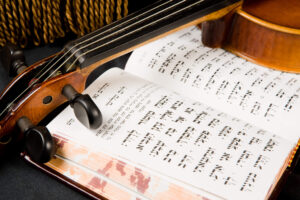 When people are asked to describe Jewish culture, probably the first thing they’ll mention is food. But music would be a close second. Storytelling through song is how the Jewish people express joy, sorrow, share values, relate their common history, convey hope for the future and create community. In the jewish culture, music is celebration, commemoration and contemplation.
When people are asked to describe Jewish culture, probably the first thing they’ll mention is food. But music would be a close second. Storytelling through song is how the Jewish people express joy, sorrow, share values, relate their common history, convey hope for the future and create community. In the jewish culture, music is celebration, commemoration and contemplation.
While the marginalization of the Jewish people leading up to the Holocaust and, ultimately, the Holocaust itself may have made it difficult if not impossible to fully live a Jewish life, music continued to be a vital part of how individual Jews, Jewish families and communities expressed their Judaism.
In fact, we could say that music played two important roles during the time of the Holocaust in Eastern Europe and even for those who were able to escape.
Music Was Humanity During An Inhumane Experience
While the Nazis were able to suppress and dismantle much of Jewish life and the freedoms of the Jewish people, whether through laws, threats or intimidation, they could not take away the songs and music that existed in their heads and hearts. Consequently, while they suffered through unimaginable and inhumane treatment, many survivors of the Holocaust have talked about how they “escaped to the music in their heads,” and, when able, sang songs with one another.
Music was also one of the few allowable freedoms that existed in some of the concentration camps. Dr. Shirli Gilbert, Deputy Director of the Parkes Institute for the Study of Jewish/non-Jewish Relations at the University of Southampton explains, “Even in the death camps, official orchestras were established and there were regular performances. Often this music-making was an activity commanded by guards, or was used by the SS to break prisoners’ wills. However, away from the eye of the SS officers, Jews secretly created their own music as a means to cope, survive and document.”
So, while it was difficult, if not impossible, for most Eastern European Jews to secure traditional foods, worship in synagogues or have prayer books, they still had their music and through song could tap into religious observance or immerse themselves in a piece of their culture, keeping Judaism alive.
Dr. Gilbert also says, “Music was used by Jews as a form of resistance against persecution…It was a way of bringing and expressing humanity during an inhumane experience. Perhaps it was an act of defiance. The Nazis could take almost everything away, but not their minds, their creativity, their memories of their culture and pre-concentration camp lives.”
Music Was A Way Of Documenting The Holocaust Experience
But music played another important role during this horrific time in the lives of European Jews. While those enduring the Holocaust — whether in concentration camps, in hiding or working to escape Europe — typically couldn’t easily record their experiences through pictures or even writing, they could, and often did, create songs and music. That music, whether written in their heads during the Holocaust or created afterwards as a way of recounting their experiences, is one of the ways that we, generations later, gain an understanding of what the Holocaust was like and what people experienced and endured.
“By studying this music,” Dr. Gilbert says, “we have been able to shine a light on the internal world of prisoner communities in the ghettos and camps set up by the Nazis. It shows the diverse ways in which prisoners understood, interpreted and responded to what was happening to them.”
The documentary, They Played for Their Lives, does a tremendous job of showcasing the role music played in the survival and later lives of eight young musicians who endured and survived the Holocaust. For them, playing music in the ghettos and concentration camps not only fostered spiritual strength, but often proved a bargaining tool that spared their lives.
The Power Of Music And Art In Jewish Culture
Studying the role of music during the Holocaust gives us insight into the innate desire of human beings to hold onto their humanity even in the most horrific of circumstances. It also emphasizes the power of music, and art as a whole, as a form of historical documentation.
The Holocaust Memorial Resource & Education Center of Florida offers numerous exhibits and programs throughout the year, often using art as a way of deepening our understanding of the Holocaust and its victims and survivors.




